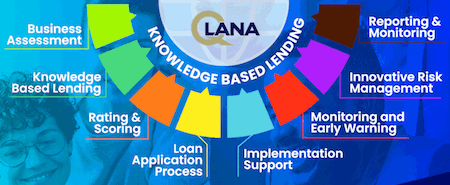The Bank of Ghana, the central bank of the country, recently introduced a series of measures to cushion the effects of the COVID-19 pandemic on microfinance institutions (MFIs). Many MFIs are struggling with liquidity for various reasons including that many have granted their borrowers repayment moratoria of up to 6 months. Citing a recent report from the Bank of Ghana, Samuel Darko, a local researcher, warns that a “liquidity stress-test conducted for the sub-sector shows minimal survival rate for
Category: Risks
MICROCAPITAL BRIEF: Accion’s CFI to Hold 6th Annual Financial Inclusion Week; October 13-16, 2020
The Center for Financial Inclusion (CFI), an initiative of US-based NGO Accion, is planning to hold the sixth iteration of its Financial Inclusion Week (FIW), an annual event aimed at promoting financial inclusion, from October 13 to October 16. FIW 2020 will focus on four of CFI’s priorities: (1) Consumer Protection; (2) Data Opportunities and Risks for Financial Inclusion; (3) Women’s Financial Inclusion; and (4) Financial Services for Mitigating and Adapting to Climate Risk. The event is aligned with the initiative’s recent moves
SPECIAL REPORT: Stakeholders Fearful, But with Tentative Hope Too in e-MFP’s Just-published “COVID-19 Financial Inclusion Compass”
The European Microfinance Platform (e-MFP) has published the COVID-19 Financial Inclusion Compass, a special edition of the Compass series specifically focused on the current challenges, medium-term priorities, concerns, opportunities and forecasts for a sector facing probably the greatest crisis in its modern history.
European Microfinance Platform (e-MFP) has published the COVID-19 Financial Inclusion Compass, a special edition of the Compass series specifically focused on the current challenges, medium-term priorities, concerns, opportunities and forecasts for a sector facing probably the greatest crisis in its modern history.
The world – the financial inclusion sector included – is in the midst of twin crises: (1) a novel and highly contagious virus with no vaccine or cure that shows no signs of abating; and (2) a genuinely global recession as a result of the unavoidable containment measures put in place. The situation is uncertain and dynamic. Six months from now, the landscape will
MICROFINANCE PAPER WRAP-UP: “Financial Literacy for Migrants: Mapping and Needs Assessment,” by Heghine Manasayan et al, from CRRC-Armenia
The authors of this paper seek to understand the needs for financial education among three groups of migrants in Armenia: (1) people who moved to Armenia or within the country for work, including workers’ family members; (2) official refugees to Armenia and those moving to the country for similar reasons; and (3) Armenian citizens who migrated to another country but then voluntarily returned or were deported back to Armenia. The methodologies were group discussion with migrants and the review of government data, such as
MEDIA OF THE MONTH: (Accidental) Loans to Farmers Keep Food on the Table
Barbara Magnoni, President of EA Consultants, discusses her column in the May 2020 issue of the MicroCapital Monitor on what the impacts of the COVID-19 pandemic can teach us about the role of agricultural lending in a diversified portfolio.
This post is part of a monthly series from MicroCapital pointing you to great media on microfinance and other forms of impact investing. Enjoy!
Do you know that MicroCapital publishes the MicroCapital Monitor newspaper each month? Find out more at http://www.microcapital.org/products-page/.
MICROCAPITAL BRIEF: Sanad Technical Assistance Facility, Egyptian Credit Bureau I-Score Seek to Boost Finance for Farmers; Agricultural Micro-, Small, Medium-sized Enterprises (MSMEs) in Egypt
The Sanad Technical Assistance Facility, which is affiliated with the Luxembourg-domiciled Sanad Fund for MSME (Micro-, Small and Medium-sized Enterprise), has collaborated with the Egyptian Credit Bureau, also known as I-Score, to build an Agricultural Credit Evaluation and Risk Assessment System (ACERS). I-Score will implement this “web-based credit assessment and scoring tool,” with the goal of
SPECIAL REPORT: COVID-19 Edition of Financial Inclusion Compass Survey Launches – Looking at Challenges and Priorities of a Sector Under Threat – An Invitation to Participate
From  the European Microfinance Platform (e-MFP): e-MFP has launched the third e-MFP survey of financial inclusion trends, but as a special edition focused solely on the challenges and priorities facing the sector as a result of the COVID-19 public health and economic crisis. Several months into this global crisis, with its critical threat to vulnerable populations, financial inclusion providers and the entire ecosystem that supports them, the scale of the challenges ahead is becoming increasingly clear, and stakeholders can think not just about the immediate effects, but their priorities in the medium term as the sector recovers from this and puts in place measures to
the European Microfinance Platform (e-MFP): e-MFP has launched the third e-MFP survey of financial inclusion trends, but as a special edition focused solely on the challenges and priorities facing the sector as a result of the COVID-19 public health and economic crisis. Several months into this global crisis, with its critical threat to vulnerable populations, financial inclusion providers and the entire ecosystem that supports them, the scale of the challenges ahead is becoming increasingly clear, and stakeholders can think not just about the immediate effects, but their priorities in the medium term as the sector recovers from this and puts in place measures to
MICROCAPITAL BRIEF: US International Development Finance Corporation (DFC) Approves $4b “Rapid Response Liquidity Facility” for Microfinance, Other Ongoing Projects Impacted by COVID-19
The government-backed US International Development Finance Corporation (DFC) recently allocated USD 4 billion to a “Rapid Response Liquidity Facility,” through which it will provide additional funding to in-process DFC projects that have been impacted by COVID-19. This financing will go to a range of current DFC clients, including microfinance institutions (MFIs) that are struggling to collect retail loan repayments, infrastructure projects experiencing delays, and hospitality businesses that have experienced “precipitous revenue losses.” The intent is
MICROCAPITAL BRIEF: Ipak Yoli Bank of Uzbekistan, IFC Collaborate to Manage Currency Risk, Increase Local-currency Financing for SMEs
The International Finance Corporation (IFC), a member of the World Bank Group, and Uzbekistan’s Ipak Yoli Bank recently signed an International Swaps and Derivatives Association Master Agreement under which they plan to execute currency-swap transactions. Saidabror Savdakhmedov, Chairman of the Board of Ipak Yoli, explained that the goal is to “help expand our lending to customers in local currency, while effectively mitigating financial risks and managing our currency-risk exposure.” In particular, the bank plans to increase local-currency financing to small and medium-sized
SPECIAL REPORT: One Size Does Not Fit All – Restructuring for Uncertain Times, from Verdant Capital
This sponsored content was written by Edmund Higenbottam and Patrick Ball, who serve, respectively, as the Managing Director and a Director of Verdant Capital. Verdant Capital is a leading specialist financial advisory firm that operates across Africa.
A  combination of factors is challenging the economic sustainability of financial institutions and other businesses large and small across Africa. Globally, the COVID-19 crisis and associated lockdowns have had the effect of “calling the end of a long bull market” that has run since the credit crisis of 2008. In most African markets, however, the bull market had already ended some years before the pandemic. Instead, in Africa, the pandemic has compounded previously existing difficulties, such as weaker commodity prices, sovereign credit challenges, volatile exchange rates and uncertain public policy regimes. Despite some differences, there are many commonalities among the issues facing traditional banks, microfinance institutions and operating companies. From an investment
combination of factors is challenging the economic sustainability of financial institutions and other businesses large and small across Africa. Globally, the COVID-19 crisis and associated lockdowns have had the effect of “calling the end of a long bull market” that has run since the credit crisis of 2008. In most African markets, however, the bull market had already ended some years before the pandemic. Instead, in Africa, the pandemic has compounded previously existing difficulties, such as weaker commodity prices, sovereign credit challenges, volatile exchange rates and uncertain public policy regimes. Despite some differences, there are many commonalities among the issues facing traditional banks, microfinance institutions and operating companies. From an investment
MICROFINANCE EVENT: CIS Islamic Banking and Finance Forum; POSTPONED; Tashkent, Uzbekistan
Originally, scheduled for August 13 to 15, 2020, this event has been postponed due to COVID-19. The new dates have not been announced. The first day of this event is
MICROCAPITAL BRIEF: 40 Funders Commit $75m via World Economic Forum COVID Response Alliance for Social Entrepreneurs
The World Economic Forum, a Switzerland-based nonprofit, recently convened the COVID Response Alliance for Social Entrepreneurs, through which 40 organizations are aligning their efforts to reduce the economic and other impacts of the COVID-19 pandemic. These 40 organizations support 15,000 entrepreneurs who have served a total of 1.5 billion customers in 190 countries by “protecting livelihoods; mitigating millions of tonnes of carbon dioxide; improving access to health, sanitation, education and energy; [and having] driven social inclusion movements for the disabled, homeless or those with refugee status.”
The alliance members have committed a total of USD 75 million in response to the pandemic. In addition, they are working together to assess needs; increase recovery funding; coordinate legal, technological and
MICROCAPITAL BRIEF: Center for the Advancement of Social Entrepreneurship (CASE) Offers Covidcap.com Database of $1t in Cash Relief for Small Businesses Impacted by COVID-19
The US-based Center for the Advancement of Social Entrepreneurship (CASE) recently created a database of funding sources for small businesses needing assistance because of the COVID-19 pandemic. These listings include 550 funding sources in 62 countries offering a total of approximately USD 1 trillion. This funding takes the form of loans and grants and is available to
SPECIAL REPORT: COVID-19: Communicate – Learn – Act, by Christian Ruehmer of Q-Lana
COVID-19  is having significant effects on our personal and professional lives. We have heard a lot of suggestions of how financial institutions can handle this critical situation. Summarizing the information of the past days and weeks, we see three key steps, “communication,” “learning” and “acting,” which can be applied among four target groups: “staff,” “clients,” “investors” and “regulators.” We keep our findings short and focused:
is having significant effects on our personal and professional lives. We have heard a lot of suggestions of how financial institutions can handle this critical situation. Summarizing the information of the past days and weeks, we see three key steps, “communication,” “learning” and “acting,” which can be applied among four target groups: “staff,” “clients,” “investors” and “regulators.” We keep our findings short and focused:
Staff:
Communicate: Staff members work from home or provides essential services under stress. Understand their worries. Show empathy for their problems. Communicate regularly through multiple channels. Encourage collaboration.
Learn: Is communication technology working? What are the personal challenges? How can staff stay motivated? Can you maintain
SPECIAL REPORT: True Leaders Shine in Crises! – by Ute Bühler, Frankfurt School of Finance and Management
Out  of control vs under control
of control vs under control
As leaders, we are a source of inspiration to those around us. We can guide others to draw on their inner strength and innovate to face challenges with courage and proactive decision-making.
I have been coaching leaders for five years at Frankfurt School. Rarely do we come across a situation like the pandemic we face today. In these times, true leaders will shine. By leadership, I mean not only leading a team but also adapting to the unexpected and creating an effective plan to deal with the situation at hand.
In my coaching sessions, I share content to help you help others navigate the uncertainty of a crisis. This includes giving you tools for continually motivating your staff, as well as maintaining
MICROCAPITAL BRIEF: 9 Microfinance Investment Vehicles Coordinate Response to Effects of Pandemic on MFIs, MSMEs in 80 Countries
The COVID-19 pandemic and efforts to reduce its health impacts have had major negative economic consequences for micro-, small and medium-sized enterprises (MSMEs). These enterprises thus are having difficulty repaying the loans they have outstanding from microfinance institutions (MFIs) and other retail lenders, leading to liquidity challenges for these lenders. In response, nine investors in these lenders, which have an aggregate of USD 15 billion invested in 80 low- and middle-income countries, are working together to support the long-term viability of the retail financial services providers (FSPs).
The nine investors, which manage a range of microfinance investment vehicles (MIVs) and other funds seeking to generate positive social impact, have arrived at a non-binding agreement to
MICROCAPITAL BRIEF: Reserve Bank of India Moves to Increase Liquidity for MSMEs, Farmers Impacted by COVID-19 via MFIs, NBFCs
In response to the COVID-19 pandemic, the Reserve Bank of India (RBI), India’s central banking authority, recently moved to increase the supply of credit to farmers and micro-, small and medium-sized enterprises (MSMEs) via microfinance institutions (MFIs) and non-banking finance companies (NBFCs). These steps include
MICROCAPITAL BRIEF: Amid Pandemic, Fintechs Pause Some Projects, But Innovate to Care for Customers, Staff
MIX, an NGO based in the US city of Washington, recently surveyed 25 financial technology (fintech) providers and investors regarding their responses to the COVID-19 pandemic. Over the past two months, investment in fintech providers has fallen, as has their revenue, due to lower remittance and lending volumes. The fees that fintechs charge are also down, sometimes at fintechs’ choosing, but sometimes by government decree. Clients have more incentive to use mobile money due to travel restrictions, branch and agent closures, and the potential transmission of germs via cash. However, they have less money to transact. One study found that four in five business owners in Kenya did not
